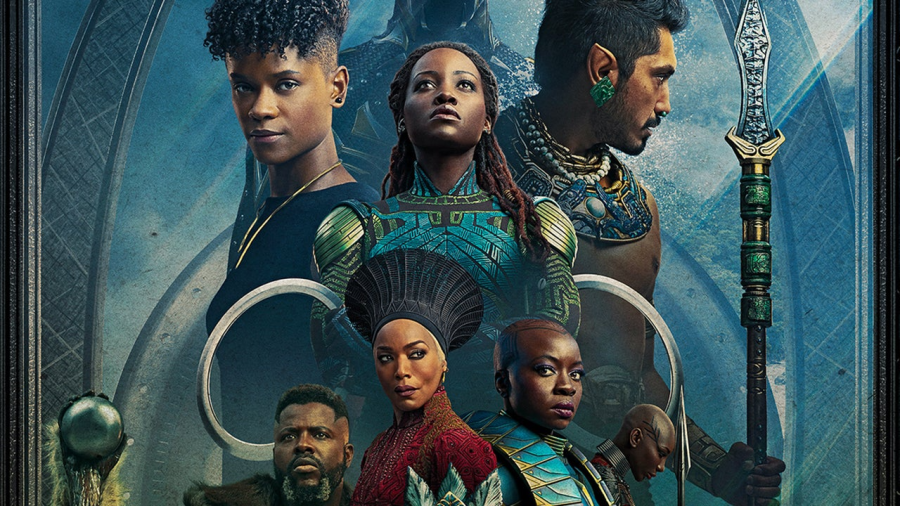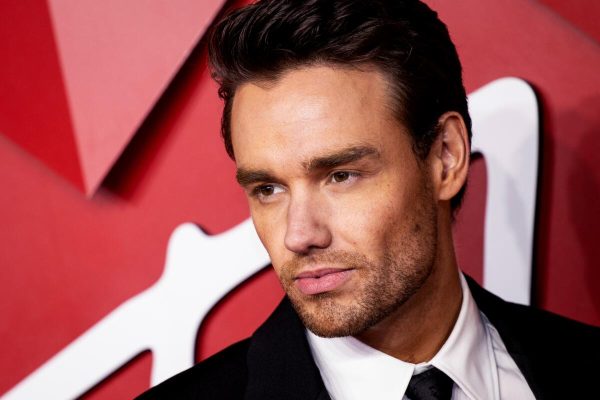Black Panther: Wakanda Forever awards season wins and nominations a fitting tribute to Chadwick Boseman
Angela Bassett (depicted bottom center) is nominated for a Best Supporting Actress Academy Award for her portrayal of Queen Ramonda in Black Panther: Wakanda Forever.
Since the tragic passing of Black Panther star Chadwick Boseman, the world has been waiting to see how one of his most prominent roles would be carried on. Black Panther: Wakanda Forever, released this past November, does an outstanding job honoring Boseman’s memory as director Ryan Coogler, manages to fit a cohesive story into one that deals with so much heartbreak and loss.
The film has so many emotional moments and many couldn’t find a dry eye in the audience. Black Panther: Wakanda Forever begins with how Boseman’s character T’challa dies and then follows with a funeral for the deceased king of Wakanda.
Coogler’s decision to hold a burial for Boseman’s character was meant to mirror his passing in real life which many regarded as respectful and necessary. Boseman’s portrayal of Black Panther meant so much to black individuals around the world. The representation that Black Panther and Wakanda represents is groundbreaking. Seeing a Black superhero on the big screen shows how all heroes don’t need to be the common Aryan male which is depicted so often in cinema.
Letitia Wright excels in the role of Shuri in this movie as she depicts so many thoughts and emotions throughout the entire movie. Most of her actions in Wakanda Forever represent how people deal with loss in unhealthy ways. She’s isolated and then eager to seek out the opposition. This behavior is not uncommon for those who struggle with guilt and depression.
Wright played this role with absolute passion, and it’s heavily detailed. In the beginning Shuri cannot save her brother, T’challa, and she feels responsible for his death. Many noticed how Wright really took those scenes to heart. It felt like Wright channeled the loss of Boseman to create those deep and touching emotions.
Wright also has a second role in this movie: Black Panther. Shuri became Black Panther out of vengeance, and many recognize how exceptionally Wright performed when she was fitted with the iconic suit. OH seniors Ashley Pereira and Sophia Anka both recall that this particular scene was their favorite in the movie.
The scene was one of the most powerful in the movie. It really showcased Wright’s ability to perform despite the talent the world lost. Wright donned the mantle to honor her onscreen brother and to be an icon for people of color globally. She delivered and her presence definitely had a resounding effect on the audience.
Another considerable performance was from every single supporting character this movie features. There is not one supporting character who didn’t perform well, and everyone’s role had meaning.
Angela Bassett was nominated for an Academy Award for her portrayal of Queen Ramonda in Black Panther: Wakanda Forever and rightfully so. Every time Bassett is in a scene, the crowd really feels her presence. She delivered lines with such might, and in the somber parts, Bassett expresses her outstanding acting prowess. When Queen Romonda dies, amidst the crowd there was disbelief. Queen Ramonda represented powerful Black women who have escaped the hardships that affect them. Bassett knew this role was important, and she did not disappoint in the slightest.
The film secured four other Academy Award nominations: Best Costume Design, Best Visual Effects, Best Makeup and Hairstyling, and Best Original Song for “Lift Me Up.”
Other notable supporting characters such as Okoye (Danai Gurira), Nakia (Lupita Nyong’o), M’baku (Winston Duke), and Ironheart/Riri Williams (Dominique Thorne) did exceptionally well in their respective roles.
“I think the performances were really good,” Anka comments. “Marvel movies have really good [performances].” Pereira agrees stating, “I think the performances fulfilled my expectations and they felt authentic.” Many agree that these actors performed amazingly and deserve the utmost respect for being a part of a movie that has so much emotion backing it.
Coogler managed to make a great movie despite tragically losing Boseman. He introduced this underwater world known as Talokan. Similar to Wakanda, Talokan represents how Hispanic people would have advanced if not for the ruthless colonization of Central and South America. Namor (Tenoch Huerta) is the ruler of this underwater global superpower and appears to be the villain of this movie. Many don’t see his character in that perspective, however. Namor is simply trying to protect his home from the atrocities of colonization, but his methods are what makes him potentially villainous.
Coogler is a genius for making Namor one of the most understandable antagonists in cinema history because his hate is justified. The wrongdoings of colonization kept his people and people like them oppressed, giving Namor a justification for his anger. Huerta encapsulates Namor with ease, and audiences recognize how amazing his performance was. It’s worth noting that Mabel Cadena as Namora and Alex Livinalli as Attuma, Namor’s generals, delivered amazing performances, and it’s unfortunate to see their hard work go unnoticed by the various film awards.
If there was one thing that fans were slightly disappointed in was that the CGI was poor at some points in the film. Despite that flaw, the movie was more than incredible. The fight choreography especially was complex and unique. An example of this is Okoye, Attuma, and Namora’s first fight scene. This portion of the movie was an amazing display of cinematography. The lack of music creates a foreboding tone, and the actual battle was suspenseful. Gurira, Livinalli, and Cadena brought their all, and it’s apparent in this scene.
The movie features a mid-credit scene that Marvel fans were all itching to see. The movie pictures Shuri burning her ceremonial garb, symbolizing how she’s moved on from her brother’s passing. This is where Coogler integrates such great technique, and tries to get the audience to accept Boseman’s passing. He would like fans to stop grieving so we can honor Boseman in a way that doesn’t bring sorrow. The big twist however is that T’challa has a son with Nakia (Nyong’o.) The part that had everyone in tears was when he revealed his real name is T’challa, a beautiful homage to Boseman.
Coogler’s decision felt like the best choice he could make. Many were asking Marvel to recast T’challa, as he stands for more than just a superhero. The Black Panther is a symbol for all people of color stating that there are heroes that look like them and that they can get through the adversities that are associated with their skin color. On the other hand, some argue that it would be disrespectful to Boseman’s memory to recast the Black Panther. Coogler definitely found a great middle ground that appeases both sides of the argument, and many agree that this was the best option.
This movie is so much more than just a superhero movie. This ensemble film represents sorrow, grief, vengeance, acceptance and it culminates so gracefully. One cannot hate on this movie for anything major, because it was so perfect. Black Panther: Wakanda Forever had every element that makes an exceptional film. From Letita Wright to Tenoch Huerta, the talent of this cast is immeasurable. Coogler deserves praise for making such an extraordinary film from a tragic loss. Chadwick Boseman would have loved to see what beautiful work Coogler and Wright achieved with Black Panther: Wakanda Forever.










